The Universal Sea team were excited to finally present the launch of our book: The Universal Sea – The art and innovation guide against the plastic epidemic. The long awaited release was celebrated with a public event on Friday, March 15th, at the Universität der Künste in Berlin. It brought together students, artists, entrepreneurs, scientists and interested members of the public to discuss, listen to and exchange ideas concerning the universal issue we are facing: the plastic epidemic.
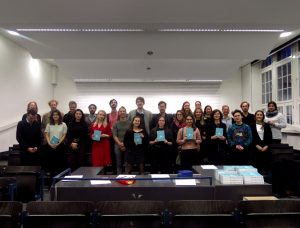
The book is a resource for smart plastic living, but more than that, it is an opportunity to harness the power of art and bring every citizen of our world into action. It showcases artists’ works, innovative plastic solutions, social initiatives, and thinkers from around the globe, all tackling topics of plastic waste and water pollution. The project was a massive undertaking of the past year, bringing together 500 artists, 500 business innovators, 40 institutions, 13 universities and 10 festivals.
The event was a day full of education, inspiration and devotion. The program featured 18 outstanding activists ranging from professors, artists, entrepreneurs and students who gave presentations and participated in a lively panel discussion.
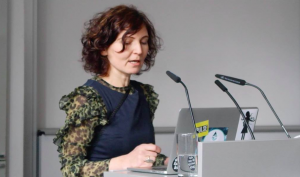 After a heartfelt thank you to all involved, co-founder Nicole Loeser posed the question “Can ART enable a momentum for significant change?” This question lays the foundation for the drive behind the entire project. “We believe collaboration is the key,” said Nicole, “by building and giving a platform to a wide community of artists, activists, innovators and change makers, and harnessing the creative and productive energy of collaboration.”
After a heartfelt thank you to all involved, co-founder Nicole Loeser posed the question “Can ART enable a momentum for significant change?” This question lays the foundation for the drive behind the entire project. “We believe collaboration is the key,” said Nicole, “by building and giving a platform to a wide community of artists, activists, innovators and change makers, and harnessing the creative and productive energy of collaboration.”
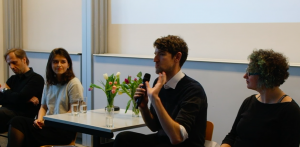
Our moderator Nicole Loeser kicked off the panel discussion by asking panelists “How do you see art helping or changing our relationship with the natural world?” and “How art and innovation collaborations can support the necessary change?”. The panelists (Prof. Gilbert Beronneau, Prof. Jose Alcarez, Prof. Dr. Käthe Wenzel, Matt Stewart, Olga Skoczyklas, Urszula Staszkop) all had their own way of saying that art has the power to reach people in a unique way. They gave examples of times when art has touched them in way that encourages them to act. E.g. Olga described a beach clean up public action by liina klaus, one of our The Universal Sea artists-in-residence. An engaging discussion moderated by Nicole followed about the benefits, challenges and ethics of artist and innovative business partnerships, and the need for a different education and greater support system for artists outside of the art market.
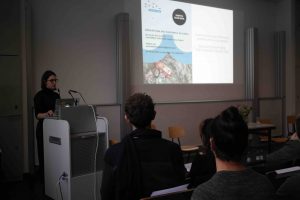
The rest of the program featured presentations, first from Sabina Damiani, the director of aMORE Festival, Croatia. She described how the problem of plastic pollution was largely under the radar in Croatia, where tourism was the top priority. The aMORE festival grew from a need to bring environmental issues to the forefront, choosing education, art and film as a way to do this. “Art is a good means for inclusivity, for all levels and backgrounds,” said Sabina.
We were also privileged to hear from artists that featured in the book. Such as Marjorie Chau, Steffen Blandzinski, and Alessio Ceruti who described the journey from his shock at the plastic problem to educating himself and developing his art practice to most effectively reach the public. Like many other speakers, Alessio stressed the importance of reaching a younger audience, saying that as an audience children are so inquisitive, curious and eager.
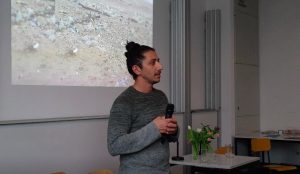
Artist Kristina Okan asked, “What is our role as artists in environmental issues, and in the world?” She posed that as art is often about self-expression, artists must learn to “combine the self and the social.” Mona Lüders, who collects people’s rubbish and creates window installations with it, calls her works “a portrait through trash.” For her, a dialogue with the participants is as important as the work itself.
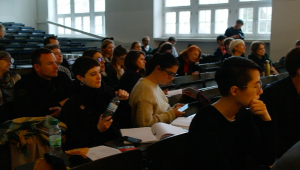
We also heard from Carina Bischof from STOP! Mirco Waste, a company that makes micro-plastic filtering laundry bags. She informed us that “how you care for your clothes has a bigger environmental impact than the production of them.” Alessio Gamba introduced the amazingly versatile material Zeoform, that is 100% plant-based and biodegradable and, as Alessio put it, “could replace 90% of the materials in this room.”
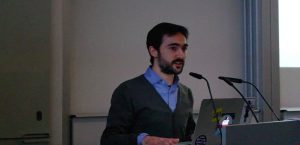
Lubomila Jordanova from Plan A, an online platform and crowdfunding site for environmental organisations and projects, shared her perspective that we are always given shock factor statistics, but what we also need is a positive framework and rhetoric of progress and active engagement.
Besides two other students, one of our own team members, Tina Bayer, shared her university research that centers on the experience of artists in collaborations with businesses and organisations. By interviewing artists from The Universal Sea network, Tina’s research gathers artist’s perspectives on what conditions and prerequisites they want and need from such cooperations—a useful insight for building a fair and productive collaboration.
The event was a great success that encapsulated the goals of the project: bringing diverse people together under one cause to create an inspiring network of innovators and change-makers.
We wish to send out a huge thank you to everyone who helped to make the book possible, and to everyone at our launch event. The Universal Sea is nothing without its wider community, a community that will stay active and engaged for much longer to come!
If you want to order copies of our guide, find it here.
All photos by Marine Dezert

We are so excited to see this collaboration of work! Thank you to The Universal Sea for making this book happen and helping to teach people worldwide about this problem.
Sharing Sustainability Together!
Karen Allen
Cali-Kart, Inc.